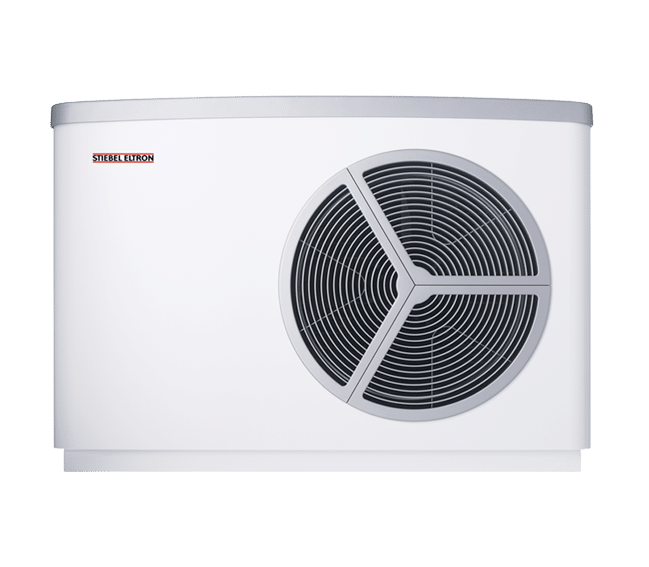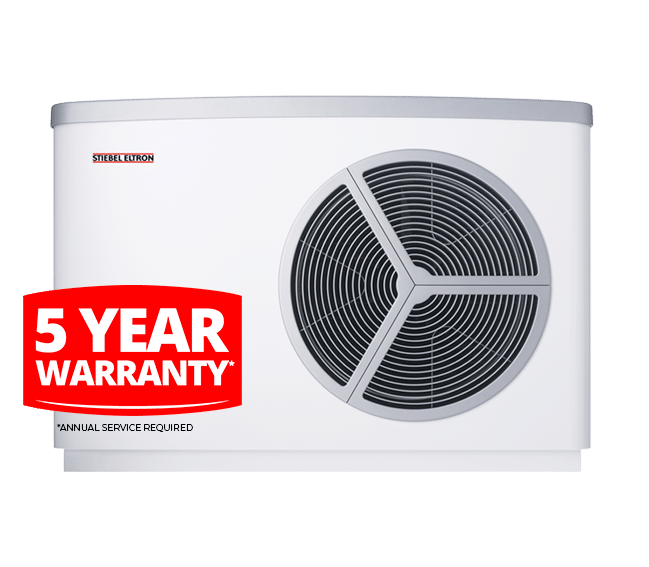Hydronic Heat Pumps
Heat pump hydronic heating is a new, all-electric alternative to the more traditional gas boiler used to heat the water to run a hydronic system.
One of the main benefits of this new technology is the lack of carbon emissions created by natural or LPG gas to heat the water. Unlike gas boilers, heat pumps do not use natural or LPG gas making them the perfect heating solutions for customers wanting to cut their emissions or don’t have any access to natural gas. This way you still have the luxury of a hydronic heating system without the carbon emissions associated with using gas to heat the water.
This also make it a less expensive option in the long term, saving money on your gas bill and, by installing a PV electrical system and batteries, further offsetting the running costs and electricity usage as much as possible.
Cutting carbon emissions, combatting climate change and saving money. That’s a win, win, win scenario.
Hydronic Heat Pump Installation
With larger and heavier equipment, heat pumps require more space than the old gas technology. They are usually ground mounted on a designated concrete pad located outside the house to maximise the amount of heat it can remove from the surrounding air.
Our installers are fully trained and qualified to install Heat Pump units with experience installing a variety of units and multiple brands. Having installed heat pumps since they first arrived on the Australian market you can trust your system to be installed by our team of specialists with their decades of expert experience.
A heat pump does require some additional electrical work when compared to gas fuelled boiler. Lucky for you we have fully trained electricians who specialise in hydronic heating installations to ensure the best workmanship possible.
As with all heating installations we would recommend annual servicing of your Heat pump equipment.
Our Heat Pumps
We endeavour to install the best equipment available in the Australian market, so we regularly change and vary our recommended brands. Heat Pump technology is constantly evolving and improving so we are adapting and updating our range of offerings constantly. We source all our heat pumps from reputable Australian distributors.
Stiebel Eltron Heat Pumps
Enjoy comfortable warmth in your home during the chilly winter months thanks to the WPL 25AC(S) range of air source hydronic heat pump from Stiebel Eltron. Heating your home with energy harvested from the air, hydronic heating is a cost-effective way to keep your home warm and cosy.
Designed for Australian conditions and outdoor installations the WPL 25 AC (3 Phase) and the WPL 25 ACS (Single Phase) systems are a perfect start for the transition from fossil fuels to renewable energies in your home. Nearly 40% of energy consumed in Australian homes is used for heating and cooling, so it makes perfect sense to install an energy efficient appliance and significantly reduce the ongoing cost of your heating system.
Benefits Include:
- Made in Germany, designed for Australian homes
- Outdoor installation
- Single phase and 3 phase models available
- Single phase and 3 phase models are available. Depending on your houses’ electricity needs.
- High efficiency due to vapour injection technology – CoP of 5 (Refer to FAQs for an explanation)
- Market leading sound technology: quiet operation at 32dB(A) from 5m distance. (The is a similar decibel – dB rating to a dishwasher.)
- Natural defrost function for energy efficient operation in cold climates down to minus -20°C
- Smart Grid and Solar PV ready
- Suited for new builds as well as renovations


*Annual service required

Stiebel Eltron Heat Pumps


Enjoy comfortable warmth in your home during the chilly winter months thanks to the WPL 25 AC(S) range of air source hydronic heat pumps from STIEBEL ELTRON. Heating your home with energy harvested from the air, hydronic heating is a cost-effective way to keep your home warm and cosy.
Designed for outdoor installation in Australian conditions, the WPL 25 AC and WPL 25 ACS systems is a perfect start for the transition from fossil fuels to renewable energies in your home. As nearly 40% of energy consumed in Australian homes is used for heating and cooling, it makes perfect sense to install an energy-efficient appliance and reduce the ongoing cost of your heating system tremendously.
Features Include:
- Made in Germany & designed for Australian homes
- Outdoor installation to harvest energy from the air and turn it into comfortable warmth in your home
- Single phase and 3 phase models available
- High efficiency due to vapour injection technology: COP of 5
- Market leading sound technology: quiet operation at 32dB(A) from 5m distance
- 65°C flow temperatures suitable for radiator heating
- Suited for new builds as well as renovations
- Natural defrost function for energy efficient operation even in cold climates down to -20°C
- Smart Grid and Solar PV ready
HYDROAIR NEXT GEN Hydronic Heat Pumps
15 kW & 22kW
The HydroAir single phase heat pump offers superior heating solutions in any domestic environment. The new range of HydroAir ‘Air to water’ heat pump harnesses invertor technology, producing high temperature heating water up to 75°C, ideal for underfloor heating and radiator systems.
Benefits Include:
- Quiet operation – single or dual fan
- Perfect for hydronic customers with no access to Natural Gas
- Single Phase Power Supply
- Possible to off-set operating costs with PV solar
- Eco friendly low GWP R290 refrigerant gas
- 5 Year Warranty Manufacturers (Parts and Labour)



Frequently Asked Questions
CoP – What is that and what does it mean?
CoP of stands for Coefficient of Performance
CoP describes the efficiency of a Heat pump. The number depicts the amount of energy output achieved for 1kw of energy input. The higher the CoP the more energy efficient.
Can hydronic heating run on electricity?
Hydronic heating is incredibly versatile and can run on both natural gas and electricity. For systems powered by electricity, a hydronic heat pump will be used to heat and circulate the water throughout the house
How does electric hydronic heating work?
Electric hydronic heating requires a heat pump. Heat pumps use electricity to heat the water, employing the same principles that air conditioners use to cool the air. They condense the heat out of the surrounding air and transfer it into the water. This heated water is then circulated throughout the hydronic system via a pump. Heat pumps can operate efficiently down to -25°C. They are also Solar PV and Smart Grid compatible, aiding in offsetting running costs and reducing carbon emissions.
How do Heat Pumps Work?
The way a heat pump works is very similar too, but opposite to an air conditioning condenser. Whereas an air conditioning condenser is designed to cool the air coming into the house, the heat pump draws the heat out of the surrounding air and uses it to heat the water circulating in the hydronic system.
Are Hydronic Heat Pumps powered by gas or electricity?
Hydronic Heat Pumps are 100% powered by electricity.
Are heat pumps energy efficient?
Heat pumps are very efficient in the way they operate. They use a fan to move air through the unit, condensing the heat out of the air and into the water. Unlike gas ducted heating, where the heat dissipates into the air, the hydronically heated water retains the temperature much more efficiently, taking much longer to cool down.
The advantage over the traditional gas hydronic boiler is that the heat pump uses only electricity, which can be sourced from the normal grid or from solar-generated electricity from your home PV system. This gives you the opportunity to cut running costs and offset your carbon emissions by not using gas.
How to size a Heat pump for my Hydronic Heating?
The first step for us on any hydronic job is to do a heat load calculation on the whole building. This figure takes everything into account from the construction materials, the level of insulation through to the amount of glass in every window. Once we have that figure we can then design your system.
That heat load figure will also determine the size of the Heat pump you require to heat your hydronic system effectively.
Can a heat pump be used with radiators?
Yes, it can. Please be aware that due to the lower water temperature generated by a heat pump the radiator panel sizes may need to increase in size to be able to put out the same amount of heat as a system being heated by a gas fuelled boiler.
Under floor slab heating, however, isn’t affected by this, as the water temperature flowing through slab heating is never over 50deg C as not to damage the slab itself. So, a heat pump is 100% compatible with under floor slab heating!
Hydronic Specialists
With over three decades of experience
we trade on our industry reputation of quality installations and superior customer service.
